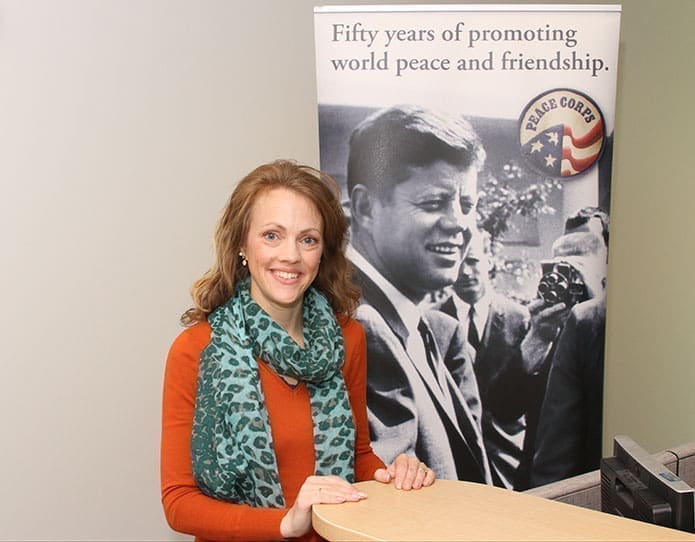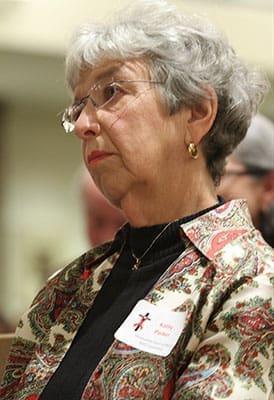 Photo By Michael Alexander
Photo By Michael AlexanderAtlanta
Peace Corps still inspires people to serve
By ANDREW NELSON, Staff Writer | Published November 21, 2013
ATLANTA—In the beginning, Monica Oliver figured with her college education and her upbringing in the United States, she’d help transform a poor community.
The Jesuit-educated Oliver was a Peace Corps volunteer living in Mali. She worked with women entrepreneurs in this West African country to start small businesses. But looking back she knows it was the community that transformed her.
“I gained a lot of perspective on love, and human beings, and how to be a decent person,” she said.
In Mali, greetings matter. A perturbed postmaster once withheld her mail for weeks when he felt she was rude to focus on checking her mailbox without talking to him.
“The experience put me in my place and to this day it serves as a reminder to me that it does not pay to be too busy or self-important to ask after another person’s well-being,” she said.
Oliver and others recalled fondly being stationed in developing countries as they served in the Peace Corps. The experience revealed the world to them and opened their eyes to the global church.
The Peace Corps is one of President John F. Kennedy’s uplifting legacies. Former volunteers talked about their life-changing experiences with the international development agency as the country marks the 50th anniversary of his assassination.
Oliver’s faith spurred her to join the Peace Corps out of a desire to serve others. It was in this Muslim country she learned a deeper way to live her faith.
“It’s just like that part of the prayer of St. Francis: ‘It’s in giving you receive.’ I’m the one who received,” she said.
Oliver’s project from 2000 to 2002 focused on microfinance. A $25 loan would be enough for women to open a business. She laughed at how the project was assigned to her despite knowing little about banking. She majored in romance languages at Loyola Marymount University in Los Angeles.
Oliver, 39, attended Mass when she could but found other ways to practice the faith. In a predominantly Muslim country, she didn’t live it “very loudly.”
“Catholic with a small ‘c’ means universal. Some of it was, some of it wasn’t” about the practice of the faith, Oliver said. In the local culture of the community, men sat on one side of the church; the women sat separately. For her the Our Father prayer was an anchor of the Mass when she understood none of the local language.
“Living the Gospel, it all comes from within. It doesn’t matter what context you are in. You can be a person for others no matter where you are,” said Oliver, before she headed off to speak to students at Georgia State University. She attends St. Thomas More Church, Decatur.
President Kennedy challenged the country in his inaugural speech: “Ask not what your country can do for you. Ask what you can do for your country.”
His 1961 speech launched a new approach to public service, helped by the creation of the Peace Corps, VISTA and other organizations that provided ways to volunteer in developing countries and among the poor in the U.S.
Catholics responded to the call, along with hundred of thousands of Americans.
The agency, which is “devoted to world peace and friendship,” came early in the administration of the first and only Catholic president. The Peace Corps’ first leader was Sargent Shriver, the president’s brother-in-law, who was known to always carry a rosary in his pocket.
Students at Catholic colleges have embraced the opportunity to serve. Jesuit-run Gonzaga University in Spokane, Wash., ranked in 2012 first among small schools on the Peace Corps’ list for producing the most volunteers for international service. Four Catholic schools, topped by Boston College, ranked in the top 25 among medium schools. A small school and medium school have an enrollment of less than 5,000 and less than 15,000, respectively.

Kathy Parker of Immaculate Heart of Mary Church, Atlanta, is seated during the homily at the 2012 World AIDS Mass. Parker headed up the AIDS ministry at her parish for 13 years. Her work with the ministry was, in part, inspired by her Peace Corps experience in Ivory Coast, West Africa back in the mid 1960s. Photo By Michael Alexander
Peace Corps volunteers by serving around the globe see the universality of the church. Prayers may be recited in a different language, but the worship was familiar, said former volunteers.
Kathy Parker, like many of her fellow students in the mid-1960s at Nazareth College in Rochester, N.Y., was “very inspired by Kennedy.”
Parker served in Ivory Coast, West Africa, for two years starting in 1965, in a community of 3,000. She was assigned to health education, especially to curb infections of Guinea worms. For Parker, her Peace Corps experience set the foundation for a career in public health. She has been a leader in the AIDS Ministry program at Immaculate Heart of Mary Church, Atlanta.
The West African church for her was different from upstate New York. “The liturgy was full of harmonizing singing and drums. It was a very festive occasion every Sunday morning,” she said.
Out of her experience, Parker said she gained “a very strong adherence to the strong social justice message of the church. In addition to becoming enamored with the social justice teachings of the church, it was the beginning of exposure to the universality of the church.”
“You could go into any church and it was the same Mass, the same Communion. I think it’s just fabulous. It was really beautiful to see it,” she said.
Tiffany Grimes described herself as agnostic during college, but in the Peace Corps she prayed at Christmas Mass, walked in the Good Friday procession, and sat at vigil celebrations at statues of the Virgin Mary that dotted her Ecuadoran community. The Alabama native lived in the South American country from 2009 to 2012.
Her small town survived on agriculture. “Beside being a school teacher or owning a small shop, the only other job would be working in the fields,” she said.
Now 27, Grimes joined the church during her year abroad.
A retreat experience drew her closer to the church. She was baptized and received first Communion in Ecuador, surrounded by 30 friends and her host family, a few weeks before she returned to the United States.
“Charity is something we put a lot of emphasis on. Being Catholic motivated me to be charitable and reach out to those in need,” she said.
She is pursing a doctorate at the University of Georgia in counseling and psychology, with research focused on women living with HIV. She attends St. Joseph Church, Athens.
By helping start businesses, or teaching a community about avoiding sickness, Peace Corps volunteers see their efforts as living out Kennedy’s vision.
Grimes said she respected Kennedy’s work on aiding the underprivileged.
“I think it’s really amazing and I am proud to be a part of something that’s linked to his legacy,” Grimes said.
Jim Sheahan, of All Saints Church, Dunwoody, was one of the early volunteers when he served from 1961 to 1963 in Sierra Leone. He worked on programs for secondary school students. Sheahan said his faith motivated him to join the Peace Corps.
“I viewed it as an important opportunity for me to devote my time and effort to working with students and the local neighborhood in improving their way of life,” he said.
“The Peace Corps is indeed one of the most visible and lasting legacies of President Kennedy. His youthful appearance and enthusiasm inspired me to volunteer in what I viewed as a great opportunity for me to help less fortunate people help themselves,” Sheahan said.
Marie Shockley, 75, retired from the federal government and joined the Peace Corps. She served in Namibia, from 2002 to 2004. Her attendance at Mass there drew attention but also built links to the community. The Peace Corps service “is a continuation of my faith,” said Shockley, who is involved with several ministries at Holy Family Church, Marietta, including St. Vincent de Paul and Habitat for Humanity.
“I think JFK was a man of vision and compassion, which is rare, especially for those who are so privileged,” she said. “I still mourn his death, and loss to us all.”